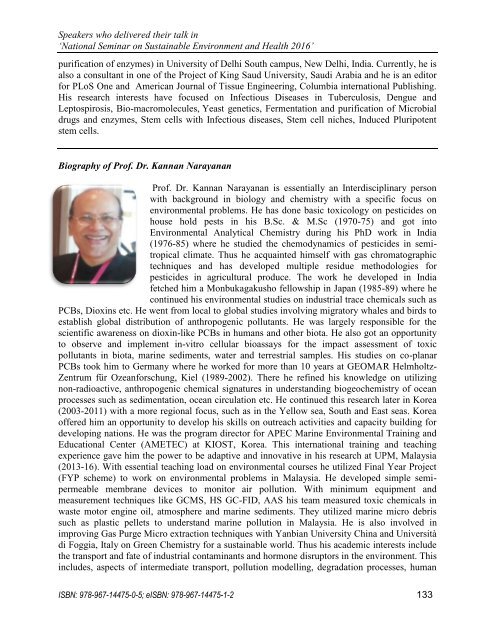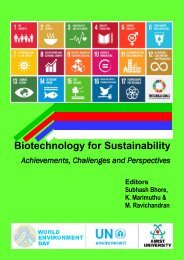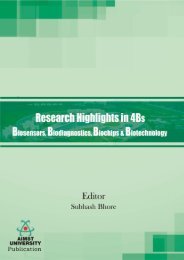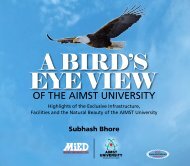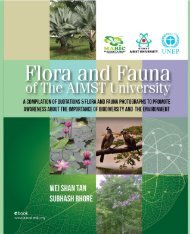Focus on Environment
This book is the Proceedings of the ‘National Seminar on Sustainable Environment and Health 2016’ & ‘World Environment Day-2016 (WED-2016)’ events held on the campus of AIMST University, Kedah, Malaysia. ISBN: 978-967-14475-0-5 (Print version); eISBN: 978-967-14475-1-2 (e-Book version) Editors Subhash Bhore & K. Marimuthu
This book is the Proceedings of the ‘National Seminar on Sustainable Environment and Health 2016’ & ‘World Environment Day-2016 (WED-2016)’ events held on the campus of AIMST University, Kedah, Malaysia.
ISBN: 978-967-14475-0-5 (Print version); eISBN: 978-967-14475-1-2 (e-Book version)
Editors
Subhash Bhore & K. Marimuthu
You also want an ePaper? Increase the reach of your titles
YUMPU automatically turns print PDFs into web optimized ePapers that Google loves.
Speakers who delivered their talk in<br />
‘Nati<strong>on</strong>al Seminar <strong>on</strong> Sustainable Envir<strong>on</strong>ment and Health 2016’<br />
purificati<strong>on</strong> of enzymes) in University of Delhi South campus, New Delhi, India. Currently, he is<br />
also a c<strong>on</strong>sultant in <strong>on</strong>e of the Project of King Saud University, Saudi Arabia and he is an editor<br />
for PLoS One and American Journal of Tissue Engineering, Columbia internati<strong>on</strong>al Publishing.<br />
His research interests have focused <strong>on</strong> Infectious Diseases in Tuberculosis, Dengue and<br />
Leptospirosis, Bio-macromolecules, Yeast genetics, Fermentati<strong>on</strong> and purificati<strong>on</strong> of Microbial<br />
drugs and enzymes, Stem cells with Infectious diseases, Stem cell niches, Induced Pluripotent<br />
stem cells.<br />
Biography of Prof. Dr. Kannan Narayanan<br />
Prof. Dr. Kannan Narayanan is essentially an Interdisciplinary pers<strong>on</strong><br />
with background in biology and chemistry with a specific focus <strong>on</strong><br />
envir<strong>on</strong>mental problems. He has d<strong>on</strong>e basic toxicology <strong>on</strong> pesticides <strong>on</strong><br />
house hold pests in his B.Sc. & M.Sc (1970-75) and got into<br />
Envir<strong>on</strong>mental Analytical Chemistry during his PhD work in India<br />
(1976-85) where he studied the chemodynamics of pesticides in semitropical<br />
climate. Thus he acquainted himself with gas chromatographic<br />
techniques and has developed multiple residue methodologies for<br />
pesticides in agricultural produce. The work he developed in India<br />
fetched him a M<strong>on</strong>bukagakusho fellowship in Japan (1985-89) where he<br />
c<strong>on</strong>tinued his envir<strong>on</strong>mental studies <strong>on</strong> industrial trace chemicals such as<br />
PCBs, Dioxins etc. He went from local to global studies involving migratory whales and birds to<br />
establish global distributi<strong>on</strong> of anthropogenic pollutants. He was largely resp<strong>on</strong>sible for the<br />
scientific awareness <strong>on</strong> dioxin-like PCBs in humans and other biota. He also got an opportunity<br />
to observe and implement in-vitro cellular bioassays for the impact assessment of toxic<br />
pollutants in biota, marine sediments, water and terrestrial samples. His studies <strong>on</strong> co-planar<br />
PCBs took him to Germany where he worked for more than 10 years at GEOMAR Helmholtz-<br />
Zentrum für Ozeanforschung, Kiel (1989-2002). There he refined his knowledge <strong>on</strong> utilizing<br />
n<strong>on</strong>-radioactive, anthropogenic chemical signatures in understanding biogeochemistry of ocean<br />
processes such as sedimentati<strong>on</strong>, ocean circulati<strong>on</strong> etc. He c<strong>on</strong>tinued this research later in Korea<br />
(2003-2011) with a more regi<strong>on</strong>al focus, such as in the Yellow sea, South and East seas. Korea<br />
offered him an opportunity to develop his skills <strong>on</strong> outreach activities and capacity building for<br />
developing nati<strong>on</strong>s. He was the program director for APEC Marine Envir<strong>on</strong>mental Training and<br />
Educati<strong>on</strong>al Center (AMETEC) at KIOST, Korea. This internati<strong>on</strong>al training and teaching<br />
experience gave him the power to be adaptive and innovative in his research at UPM, Malaysia<br />
(2013-16). With essential teaching load <strong>on</strong> envir<strong>on</strong>mental courses he utilized Final Year Project<br />
(FYP scheme) to work <strong>on</strong> envir<strong>on</strong>mental problems in Malaysia. He developed simple semipermeable<br />
membrane devices to m<strong>on</strong>itor air polluti<strong>on</strong>. With minimum equipment and<br />
measurement techniques like GCMS, HS GC-FID, AAS his team measured toxic chemicals in<br />
waste motor engine oil, atmosphere and marine sediments. They utilized marine micro debris<br />
such as plastic pellets to understand marine polluti<strong>on</strong> in Malaysia. He is also involved in<br />
improving Gas Purge Micro extracti<strong>on</strong> techniques with Yanbian University China and Università<br />
di Foggia, Italy <strong>on</strong> Green Chemistry for a sustainable world. Thus his academic interests include<br />
the transport and fate of industrial c<strong>on</strong>taminants and horm<strong>on</strong>e disruptors in the envir<strong>on</strong>ment. This<br />
includes, aspects of intermediate transport, polluti<strong>on</strong> modelling, degradati<strong>on</strong> processes, human<br />
ISBN: 978-967-14475-0-5; eISBN: 978-967-14475-1-2 133


